Yeah, when my friend sent me an email about "Spocking the five" yesterday, I read it a couple of times before giving up, too. But the Bank of Canada has no problem with it:
It turns out there's not a lot of logic in the belief that it's against the law to Vulcanize Sir Wilfrid Laurier's likeness on the $5 bill.
The death of Leonard Nimoy last week inspired people to post photos on social media of marked-up banknotes that show Canada's seventh prime minister transformed to resemble Spock, Nimoy's famous "Star Trek" character.
For years, Canadians have doodled Spock's pointy Vulcan ears, sharp eyebrows and signature bowl haircut on the fiver's image of Laurier, the first francophone PM.
Contrary to popular belief, it's not illegal to deface or even mutilate banknotes, the Bank of Canada said Monday -- although the publication of a banknote's likeness is still prohibited, except under certain conditions.
In other words, you're allowed to do this:

Photo: Tom Bagley, The Canadian Press
LLAP, Canada.
CitiLabs' Feargus O'Sullivan thinks London should stop looking to New York for guidance and concentrate on a city closer to home:
[L]et me outline the difficulties the U.K. capital faces. London's property prices are spiraling, products of a housing drought that's turning decent apartments affordable on a working class wage into urban legends. The city's inequality chasm is widening inch-by-inch, and once economically diverse neighborhoods risk becoming monocultures. This has helped to deaden and marginalize aspects of the city's cultural life that made London vibrant in the first place—a lesser point than displacement, no doubt, but a problem nonetheless. Meanwhile, the city's regenerative energies are ignoring the small print of daily livability and being channeled into ridiculously flashy grand projects that see the city as a mere display cabinet in which to cluster expensive, largely functionless infrastructural tchotchkes.
Does this all sound familiar, New Yorkers?
What makes [London mayor Boris] Johnson's NY-LON obsession more frustrating is that London actually has a far more relevant role model closer to home. It's a place that has strong historical connection with London, a city whose architecture and cultural life London long strove to emulate. Obviously, I'm talking about Paris.
It's worth a (quick) read.
CityLab's Eric Jaffe takes a good look:
Let's acknowledge, right from the start, that there's a lot to like about Chicago's long-awaited, much-anticipated Central Loop BRT project, which is scheduled to break ground in March. The basic skeleton is an accomplishment in its own right: nearly two miles of exclusive rapid bus lanes through one of the most traffic-choked cities in the United States. The Central Loop BRT will serve six bus routes, protect new bike lanes, connect to city rail service, and reduce travel times for about half all people moving through the corridor on wheels. Half.
Officially, CTA says the Ashland plans are proceeding at pace. The agency is considering public feedback gathered during community meetings in 2013 and working through the "higher-than-anticipated number of comments," as part of the standard procedure for a federal environmental analysis. Meantime, CTA continues to pursue funding for the project's next design. Spokesman Steele says it's "too soon to tell" what a timeline for the corridor will be.
BRT solves the problem of getting people around quickly without building new rail lines. Chicago's geography makes BRT development a lot easier than it would be in other cities as well. It would be cool if, a year from now, I'm whizzing to the Loop in 20 minutes by bus, instead of my current 40.
Chicago's municipal election last night failed to elect a mayor:
Chicago's incumbent mayor now is destined for an April 7 runoff election against Cook County Commissioner Jesus "Chuy" Garcia in an unpredictable battle over the city's future and the right way to get there.
With just 5 percent of precincts yet to report, Emanuel had 199,861 votes, a bit over 45.4 percent. He hovered at that level most of the evening.
It was agonizingly close for him, but still short of the 50 percent-plus-one vote he needed to avoid a runoff.
So, six weeks from now, we have another election. It's not clear at this point which of them will win, because all of Emanuel's challengers appear to be endorsing Garcia now.
Between rehearsals, work, and life, I haven't had a lot of time during the day to goof off keep abreast of world developments. So here's what got sent to my Kindle just today:
Also, if you live in Chicago, go vote today.
A joint US-UK operation has obtained the master encryption keys to billions of mobile phones:
The hack was perpetrated by a joint unit consisting of operatives from the NSA and its British counterpart Government Communications Headquarters, or GCHQ. The breach, detailed in a secret 2010 GCHQ document, gave the surveillance agencies the potential to secretly monitor a large portion of the world’s cellular communications, including both voice and data.
With these stolen encryption keys, intelligence agencies can monitor mobile communications without seeking or receiving approval from telecom companies and foreign governments. Possessing the keys also sidesteps the need to get a warrant or a wiretap, while leaving no trace on the wireless provider’s network that the communications were intercepted. Bulk key theft additionally enables the intelligence agencies to unlock any previously encrypted communications they had already intercepted, but did not yet have the ability to decrypt.
Oh, goody. Essentially, if you have a phone with a SIM card (in the U.S., that means you have AT&T or T-Mobile), the NSA and Britain's GCHQ can listen in to your conversation in real time. (The article goes into some good technical depth about the exploits and how they did it.)
Of course, they would have to be looking for you in order to do that, but still. This is the kind of revelation that (a) makes me think Edward Snowden may not have been such a bad guy after all, and (b) that because so few people care, the world is a scarier place.
By the way, I'm right now reading The Honourable Schoolboy, having finished Tinker Tailor Soldier Spy in London last weekend. I'm rooting for Smiley and Westerby just the same. But you know, the USSR had 15,000 nuclear bombs pointed at us, and Western spying back then was aimed at the USSR, not at its own citizens.
Another big walking day in sunny weather took me up to Bernauerstraße and the Gedenkstätte Berliner Mauer (Berlin Wall Memorial):
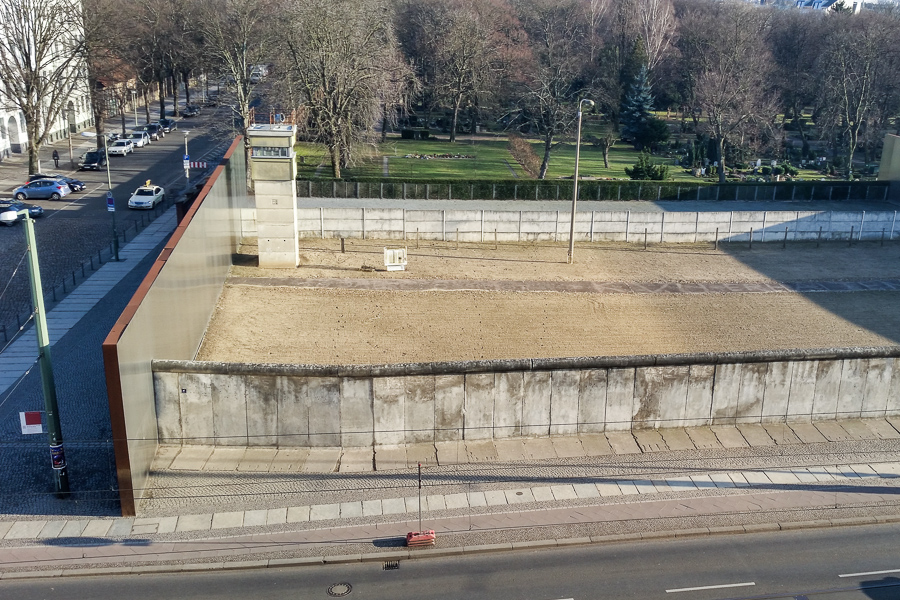
That's a mostly-preserved but partially-reconstructed section of the wall at the corner of Bernauerstraße and Ackerstraße, near the site where the first person trying to flee over the wall was killed. It's hard to imagine that the place I'm sitting now was once in East Berlin, just a few hundred meters from the place by the Wall where Reagan gave his famous speech in 1987.
I ended the walk at the DDR Museum, which outlined what life in East Germany was like from 1945 to 1990. In between I walked down Big Hamburger Street Große Hamburger Straße, in the old Jewish quarter, and stopped to check email (and have some non-German beer) at Sophie'n eck:
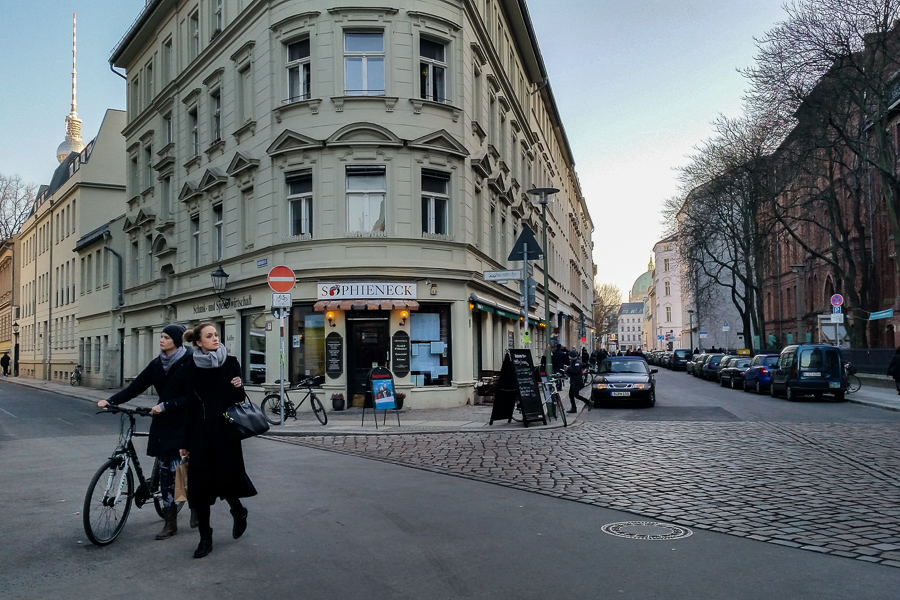
This is just a few meters from the monument to all of Berlin's Jews killed during the Holocaust. More grim history.
It's also fairly close to Museum Island which—wait for it—is an island on which sits nothing but museums (and the occasional cathedral). Here's the view looking downstream from the northern tip of Museums-Insell:
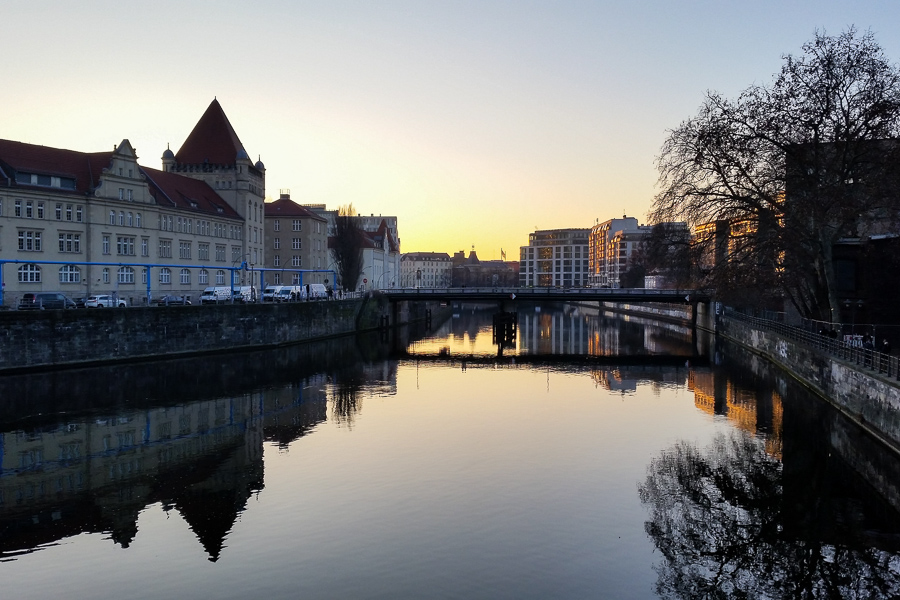
Upstream a bit is the Berlin Dom, which is not a BDSM maneuver but is still big, intimidating, and German:
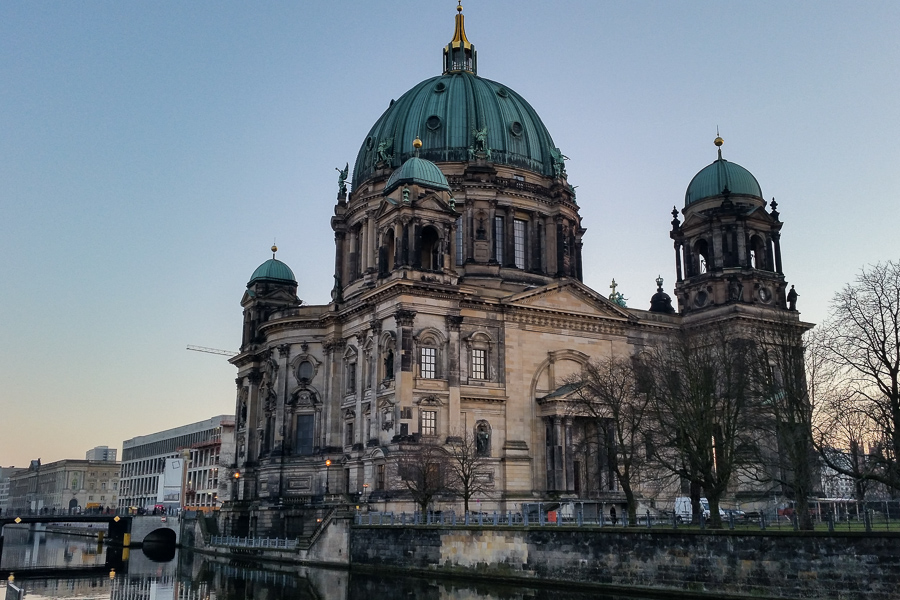
Note that all of these photos are from my mobile phone. I have a few hundred on my real camera, but they're inaccessible right now because I forgot the proper cable. I aim to have some of those photos up by Wednesday or Thursday.
Tomorrow I'm off to my second-favorite city in the world, where I have set aside time and calories to park at Southampton Arms for a couple of hours.
Tonight, though: I've got another 6,000 steps to go. I missed 20,000 yesterday by just a handful, but I have over 100,000 for the week, putting me almost up to 80 km. (I've yet to hit 15 km in a day. Maybe tomorrow?)
Since Obamacare took effect, millions of Americans have gotten health insurance:
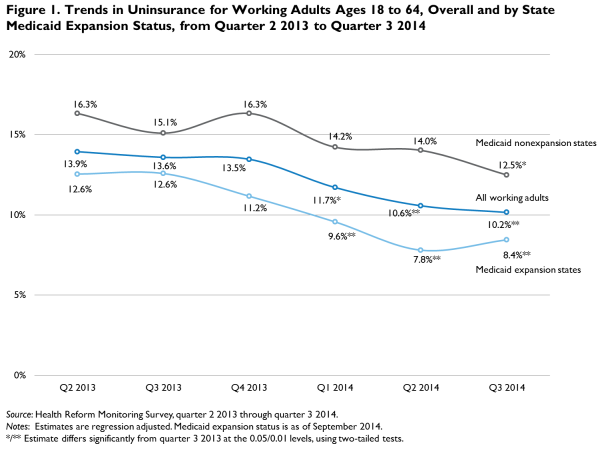
The percentage of uninsured Americans has fallen from 13.9 percent to 10.2 percent since Obamacare coverage took effect, according to new data from the Urban Institute.
The difference is even more pronounced in states that expanded Medicaid under the law. In those states, the uninsured rate dropped from 12.6 percent to 8.4 percent from the second quarter of 2013 to the third quarter of 2014.
In states that didn't expand Medicaid, the uninsured rate still fell but not quite as significantly: 16.3 percent to 12.5 percent.
In short, Obamacare is doing what it set out to do.
This happens all the time, so to speak, but every winter there are proposals to scrap daylight saving time in various state legislatures. The latest one that passes the laugh test is Oregon's, especially since it wouldn't take effect until 2021.
It probably won't go anywhere. Once people start thinking about 4:30am sunrises in June with 7:30pm sunsets, daylight saving time makes more sense. But we'll keep watching.
I may have time to read these over the weekend. Possibly.
In other news, J's Lincoln Park will close Sunday night, the owner having sold his lease to Bank of America. So our dog-friendly Euchre nights will have to move uptown a bit. I'm happy for the owner, but kind of sad that one of the last dog-friendly bars in my neighborhood is closing.
Back to creating a separate code repository for contractors...and other things...